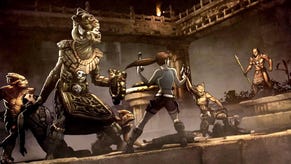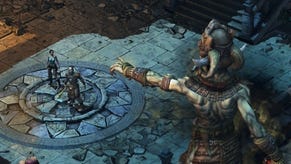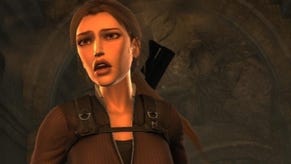Lara Croft and the Guardian of Light
Lara, Lara laughs.
Back in co-op land, the puzzles range from giving leg-ups on undead Aztec warrior Totec's shield, to more complex and dangerous team-work. Totec can also shield Lara from enemy fire, protecting her while she operates switches or machinery. Lara, meanwhile, carries a handy grappling hook to perform wall runs, abseil down cliffs and create tightropes for Totec to saunter across.
It looks like communication will be key here. There are no emotes or non-vocal communications, so headsets are going to be a must for the more advanced puzzles. Often, a leap of faith is required, meaning Lara must grapple to Totec to survive. Obviously, if he's the one doing the jumping it's totally up to the plucky heroine to decide if it's worth the bother, but unless you're keeping each other up to pace with what you're doing there are likely to be tantrums.
Many of the puzzles have a physical element, a legacy of the Underworld engine being used for the game. Scattered around the level I play are giant, spiky metal balls - like huge malignant conkers. Grabbing these allows you to manipulate them, blocking jets of fire or depressing floorplates, but they can also be bounced around with the remote bombs. Predictably enough, crushing your friends with these looks set to be a popular pastime.

One puzzle we come across featuring these balls has a mini-challenge attached. One of the spiky balls is attached to a post in a dank crypt, spinning around the centre-point. Not too far away lies a fire-pit, blocking access to the next area. Being a practical man, I get ready to blow up the post with a bomb and roll the freed ball over to the grate. There's a more stylish method, however, which will earn you one of those mysterious artefacts.
Bombing the ball at exactly the right time unleashes it like a pool ball, rolling it neatly into the fire and allowing us to continue. Obviously, I miss, but the idea is there. Completing these puzzles by the route less travelled often opens up hidden areas, too, in addition to the critical path revealed by the simplest solution. Later on, we come across a sectioned floor covered in ominous looking holes, gaming shorthand for a spiky hazard. True enough, stepping one gives Lara a second or so's grace before being shish-kebabed, so the journey to the two-floor plates is a relatively simple one for our heroine and her spear-wielding companion.
The tougher challenge is to activate all of the squares in one run, weaving in and out across the 40 or so sections without re-crossing your path. This done, a section of wall slides down to reveal another small ante-chamber with another puzzle.

It all bodes well for the exploration element, and replay value. The path through the temple level which we're laying is linear, but branches and optional areas are scattered everywhere just off the beaten track. It all feels very open, but not in the traditionally bewildering Tomb Raider way - there should be none of the frustrating back-tracking through environments which the more complex tombs of Lara's previous games feature. In fact, the experience seems to be designed to avoid any of those moments - focussing instead on fun and action, a fitting style for a download-only release.
This isn't Tomb Raider. That's something which both Crystal Dynamics and Eidos want to make clear. That's doubtless going to upset a few people, but if you're willing to keep an open mind and look at Lara in a new light, this could be the start of something very interesting indeed.







